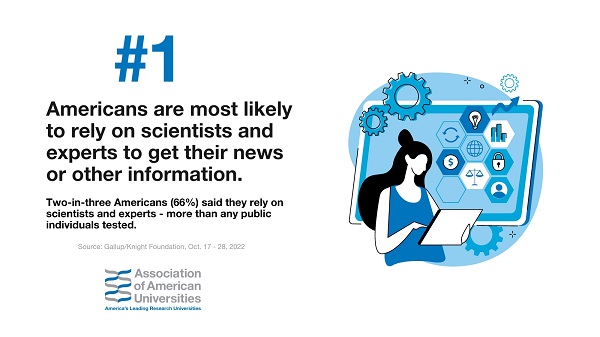 Possible Effects of Debt Default on Higher Education and Research
Possible Effects of Debt Default on Higher Education and Research
Treasury Secretary Janet Yellen said last week that the United States could run out of cash to pay the country’s debt obligations as soon as June 1 unless Congress takes action to raise the debt ceiling. Financial experts have issued dire warnings regarding the impact of a debt default, and while the effects of an unprecedented default are difficult to predict, they would likely touch every sector of the economy – including higher education and research.
According to Inside Higher Ed, “the immediate and more far-reaching consequences of the default will likely depend on how long it persists,” but even a short-term default would have devastating economic impacts that could eventually make it more expensive for institutions to operate and for students to afford education.
In the event of a default, the administration is expected to prioritize actions related to national security and safety. Federal agencies will, in all likelihood, discontinue disbursing research grant funding and providing other research support. As The Wall Street Journal reports, “A funding gap could disrupt work, especially in the sciences where academics work with perishable materials.”
There may also be disruptions to the distribution of financial aid to students if the default lasts into the fall. According to The Wall Street Journal, even a short-term default could cause students planning to attend school this fall to “drop out for fear their financial aid won’t come through.”
President Biden said last week that he was confident that “America will not default.” House Speaker Kevin McCarthy (R-CA) has also expressed optimism about a possible debt deal.
 AAU Welcomes Nomination of Monica Bertagnolli to Lead the NIH
AAU Welcomes Nomination of Monica Bertagnolli to Lead the NIH
Last week, President Biden announced that he intends to nominate Monica Bertagnolli to lead the National Institutes of Health. “Dr. Bertagnolli is a world-class physician-scientist whose vision and leadership will ensure NIH continues to be an engine of innovation to improve the health of the American people,” said President Biden.
Bertagnolli is currently the director of the National Cancer Institute and has previously served as the Richard E. Wilson Professor of Surgery at Harvard Medical School and a surgeon at Brigham and Women’s Hospital in Boston. As AAU President Barbara R. Snyder noted in her statement welcoming the nomination, Bertagnolli is “an innovative leader in oncology clinical research who has, for decades, championed collaborative initiatives to expand access to care and promoted strategies to improve clinical research data infrastructure.”
The nominee is a graduate of two AAU universities, with a bachelor’s degree in engineering from Princeton University and a medical degree from the University of Utah. Once confirmed by the Senate, she will be only the second woman to lead this critical agency.
The White House welcomed AAU’s endorsement of Bertagnolli as the next NIH director.
 National Security Leaders Urge House China Select Committee to Address Immigration Bottlenecks and Enhance U.S. Competitiveness
National Security Leaders Urge House China Select Committee to Address Immigration Bottlenecks and Enhance U.S. Competitiveness
Last week, Axios reported that “more than five dozen experts, including former national security officials” sent a letter asking the leaders of the House Select Committee on the Strategic Competition Between the United States and the Chinese Communist Party to “address the emerging gap in advanced STEM talent with China.”
The letter noted that “critical sectors of our defense-industrial base rely on attracting global STEM talent” and that the committee “has a critical opportunity to highlight the self-inflicted drag that immigration bottlenecks impose on U.S. competitiveness.” The letter cited recent studies that show “80% of STEM master’s graduates leave the United States, largely as a result of policy restrictions” and that “half of advanced STEM workers in the defense-industrial base were born abroad.” Without reforms to our immigration system, the letter said, the United States stands to endanger its “national advantage by driving international science and engineering talent elsewhere.”
The letter urged the committee to consider paired policies that exempt advanced STEM degree holders from green card caps and that “protect government-supported research and development.” The letter called on the committee to “conduct a substantive hearing expanding the U.S. talent bottleneck” and to “issue a prescriptive report” with suggested policy actions. “China is the most significant technological and geopolitical competitor our country has faced in recent times,” the letter noted, adding: “With the world’s best STEM talent on our side, it will be very hard for the United States to lose.”
![]() Congress, Biden Administration Falling Short of Funding CHIPS and Science Act
Congress, Biden Administration Falling Short of Funding CHIPS and Science Act
New analyses by the Federation of American Scientists and the Brookings Institution show that both the FY23 Consolidated Appropriations Act and President Biden’s FY24 budget request have fallen short of including full funding for the bipartisan CHIPS and Science Act passed last year. The CHIPS and Science Act authorized funding increases for key federal science agencies, including the National Science Foundation and the Department of Energy’s Office of Science, to help fuel scientific research and innovation and to keep the United States competitive on a global stage.
Actual and proposed funding levels for the agencies, however, have fallen well below the threshold authorized in the legislation. As the Brookings Institution analysis states, “This year’s omnibus funding remained nearly $3 billion short of the authorized levels for research agencies, while the 2024 budget request undershoots agency targets by over $5 billion.” With widespread cuts to federal funding on the table this Congress, “it’s even harder to be optimistic about the odds of fulfilling the CHIPS and Science Act’s vision of resurgent investment in American competitiveness,” the Brookings analysis continued.
President Snyder said in a blog post last year that “the CHIPS and Science Act is a monumental policy achievement for America’s scientific research enterprise” and that Congress must “put real money behind this groundbreaking framework.” She continued: “We’ve come this far; we now must put our money where our good intentions are.”
FY24 Appropriations Update
Last week, subcommittees of the House Appropriations Committee marked up four FY24 spending bills – Military Construction, Veterans Affairs, and Related Agencies; Legislative Branch; Homeland Security; and Agriculture, Rural Development, Food and Drug Administration, and Related Agencies. The full committee is expected to hold markups for the Military Construction-VA and Legislative Branch bills tomorrow and for the Homeland Security and Agriculture-FDA bills on Wednesday.
Meanwhile, Senate Appropriations Committee Chair Patty Murray (D-WA) and Vice Chair Susan Collins (R-ME) announced that they plan to “hold markups of bipartisan funding bills in June.”
Leading Research Universities Report to Return on Monday, June 5
Due to Memorial Day, the Leading Research Universities Report will take a break from publication next week. The next edition will be released on Monday, June 5.
News of Interest
The Hill: Forget That $90,000 Sticker Price: College Costs Are Actually Going Down – While sticker prices for colleges can be shocking, the net amount that students and their families actually pay for college is going down thanks to “scholarships, discounts and grants.” According to the College Board, the net price of attendance at public colleges “has dropped by 13 percent in five years.”
The Chronicle of Higher Education: Share of Hispanic College Students Has Nearly Doubled Since 2005 – According to the U.S. Census Bureau, “nearly one in five college students ages 18-24 identifies as being of Hispanic or Latino origin” as opposed to one in 10 in 2005. The rise in students coincides with “a rapidly growing number of Hispanic-serving institutions, a federal designation that can be accompanied by money.” In 2019, a total of 569 institutions were classified as Hispanic-serving institutions; in 1994, only 189 institutions qualified as HSIs.
The Hill: Pause on Student Loan Payments About to End for Millions – Education Secretary Miguel Cardona confirmed during a Senate hearing that, with the end of the COVID-19 emergency, student loan repayments will soon resume. President Biden had previously announced that repayments would resume within 60 days of a Supreme Court ruling on his student loan forgiveness plan or 60 days after June 30, whichever comes first.
The Wall Street Journal: IBM, Google Give $150 Million for U.S.-Japan Quantum-Computing Push as China Looms – IBM and Google are giving $150 million to the University of Chicago and the University of Tokyo to advance quantum computing research. The two universities will help build a “quantum-centric supercomputer” and “educate a generation of quantum specialists.”
Miami Herald: DeSantis Continues to Mold Higher Education in Florida by Signing Three New Bills – Florida Governor Ron DeSantis has signed three new bills “that will bring major changes to Florida’s colleges and universities.” One of the bills “restricts certain topics from being taught in general education courses;” “limits protections for tenured faculty members;” and “prohibits spending related to diversity, equity and inclusion programs beyond what is required by accreditors.” The other two bills support workforce education and prevent “schools from requiring students and staff to fill out diversity statements.”
USA Today: The College-Going Gap Between Black and White Americans Was Always Bad. It’s Getting Worse – Black college and university enrollment dropped “22% between 2010 and 2020, or by more than 650,000 students,” and is continuing to drop. While the number of white students in college has also dropped since 2010, “the difference between the proportions of white students and Black students graduating with degrees has gotten bigger.” Cost of college, quality of K-12 education, a wealth divide, and discrimination are just some of the reasons behind the growing disparity.
AP: New Rule Targets College Programs That Leave Grads with Low Income, High Debt – The Education Department has issued a new proposal targeting programs that leave students with high student loan debt and low earnings upon graduation. The proposed rule would apply to programs at for-profit colleges and certificate programs at nonprofit colleges and universities.
Featured Research

AI Could Run a Million Microbial Experiments Per Year
Researchers at the University of Michigan used an artificial intelligence platform to significantly speed up experiments on bacterial growth. The team “ran up to 10,000 experiments in a single day” to determine which combination of amino acids fuel the growth of beneficial microbes in the human mouth. Scientists expect that using artificial intelligence to run experiments “could tell us much more about the 90% of bacteria that humans have hardly studied.”

How Technology Can Save Lives from Opioid Overdose When People Use Drugs Alone
Naloxone can help prevent death from opioid overdose, but only if a bystander is present to administer it. Researchers at Brown University and Rhode Island Hospital are working to evaluate and develop “apps, monitors and other emerging technologies” that can help prevent opioid overdose deaths when people use drugs alone. The technologies use “community helpers” who can respond quickly in case of an overdose.
Stat of the Week

Americans Rely on Scientists and Experts to Get News and Information
A study conducted by Gallup and the Knight Foundation found that 66% of Americans say that they rely on scientists and experts to get news or other information. Americans relied more on scientists and experts than other public individuals, including journalists, politicians, and religious leaders